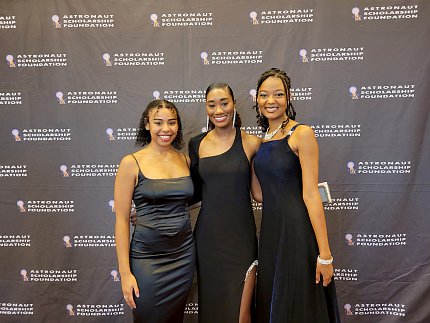Making History
NIEHS Trainee Named 2022 Astronaut Scholar

Photo: Steve McCaw/NIEHS
Tanae Lewis, a 2021-2022 trainee in the Scholars Connect Program (NSCP) at the National Institute of Environmental Health Sciences (NIEHS), recently made history after being named a 2022 Astronaut Scholar—one of just 68 across the nation.
The scholarship was created to ensure that the United States maintains its leadership in science and technology by supporting the most promising science, technology, engineering and math (STEM) college students.
Lewis, a senior chemistry student at North Carolina Agricultural and Technical State University (NC A&T), is the university’s first Barry Goldwater Scholar to also be named an Astronaut Scholar, and the first college student from a historically Black college or university (HBCU) to achieve this dual recognition. The Goldwater Foundation Awards select college sophomores and juniors who intend to pursue research careers in the natural sciences, mathematics and engineering.
Lewis completed a year-long biomedical research internship at NIEHS, studying how the disruption of RNA processing pathways can lead to neurodevelopmental disease.
As an Astronaut Scholar, Lewis will receive a $15,000 scholarship, a paid trip to Orlando to attend the annual scholarship’s Innovators Week and Gala and lifelong engagement with astronauts, researchers, innovators and alumni scholars.
“The NIEHS Scholars Connect Program that Tanae Lewis took part in last year was developed to enhance the training and mentoring of our future scientific leaders,” said NIEHS scientific director Dr. Darryl Zeldin. “Tanae’s selection as an astronaut scholar not only speaks to the success of the program but also to the hard work and dedication of her outstanding mentors.”

Photo: Steve McCaw/NIEHS
Lewis’s NIEHS mentors are Dr. Robin Stanley, who leads the nucleolar integrity group, and postdoctoral fellow Dr. Cassandra Hayne.
“Cassandra and I are super proud of Tanae and all her accomplishments,” Stanley said. “Due to Covid restrictions, Tanae’s Scholars Connect experience was virtual, but despite this, she persevered and was able to accomplish quite a lot.”
“I am truly grateful for the experience and opportunity to work at the National Institute of Environmental Health Sciences in Dr. Stanley’s lab mentored by Dr. Hayne,” Lewis said. “My research experience was outstanding, to say the least. I learned a lot in this lab and the work prepared and taught me how to think like, and eventually become, a great scientist.”
Lewis keeps busy investigating neurodegenerative disorders and hopes to one day research new treatments and technologies for Alzheimer’s disease.
She also is a newly published research scholar and contributed to a review article that was posted in the September/October issue of WIREs RNA.
“Using new advancements in the prediction of protein structure, we propose a structural model of the human tRNA splicing endonuclease complex,” Lewis and coauthors wrote.
Lewis, Hayne and Stanley are researching a neurodegenerative disease called pontocerebellar hypoplasia, which is characterized by abnormal prenatal brain development.
The team explored mutations of the proteins involved in transfer RNA processing and how such defects can lead to the condition.
During her NSCP training, Lewis learned to use cryogenic-electron microscopy, which enables 3D visualization of protein structures.

Photo: courtesy Tanae Lewis
The Astronaut Scholarship was created in 1984 by the surviving Mercury 7 astronauts. The program provides academic scholarships to second- and third-year STEM students who are intent on pursuing research or advancing their fields upon graduation.
“Dr. Bernard Harris broke the ceiling by being the first Black American to perform a spacewalk and is helping ensure that all students—especially Black Americans—have access to high-quality STEM education,” said Lewis. “I can contribute to the diversity of the biomedical sciences profession by creating a unique voice and perspective while improving an environment that invites more underrepresented minorities to work in this field.”
